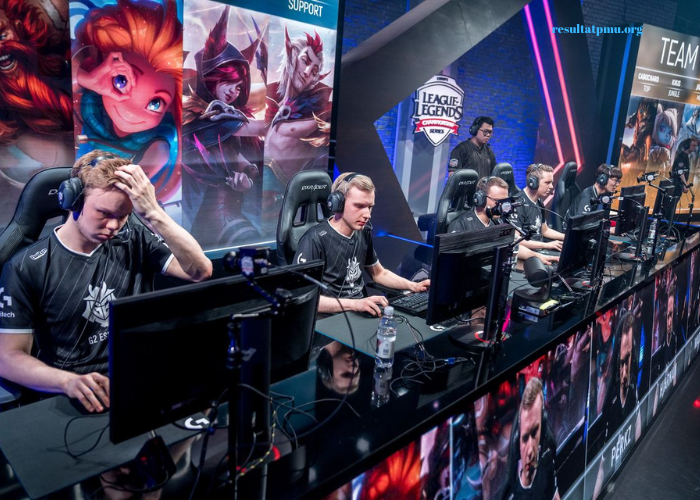In recent years, esports has emerged as a formidable force in the world of entertainment, evolving from niche gaming competitions into a multi-billion dollar industry that captivates millions around the globe. With its rapid growth, esports has transcended traditional gaming, establishing itself as a cultural phenomenon that blends competition, entertainment, and community. This article explores the rise of esports, its impact on global entertainment, and its future potential.
The Birth of Esports
Esports, short for electronic sports, refers to organized, multiplayer video game competitions. The origins of esports can be traced back to the early 1970s when the first video game competitions took place. However, it wasn’t until the 1990s, with the advent of the internet and the rise of competitive games like “Street Fighter” and “Quake,” that esports began to gain traction. The first notable tournament, the “Red Annihilation” in 1997, attracted a significant audience and laid the groundwork for future competitions.
As technology advanced and gaming consoles became more sophisticated, the scope of esports expanded. Games like “Counter-Strike,” “StarCraft,” and “Dota 2” gained massive followings, leading to the establishment of organized leagues and tournaments. The growth of platforms like Twitch, which allows gamers to stream their gameplay live, further propelled esports into the mainstream.
The Global Reach of Esports
One of the most remarkable aspects of esports is its global appeal. What was once a niche hobby has transformed into a worldwide phenomenon, with millions of fans tuning in to watch their favorite players and teams compete. According to a report by Newzoo, the global esports audience was estimated to reach 532 million in 2022, with expectations to grow to over 640 million by 2025.
Major Tournaments and Events
Esports tournaments now attract audiences comparable to traditional sports events. The “International,” an annual Dota 2 tournament, boasts one of the largest prize pools in esports, often exceeding $30 million. Similarly, the League of Legends World Championship draws millions of viewers each year, showcasing the pinnacle of competitive gaming. These events are not only watched online but also fill arenas around the world, with fans eager to experience the electrifying atmosphere of live esports competitions.
Diverse Gaming Genres
Esports encompasses a wide range of gaming genres, appealing to various demographics. From first-person shooters (FPS) like “Call of Duty” and “Overwatch” to multiplayer online battle arena (MOBA) games like “League of Legends” and “Dota 2,” the diversity of games ensures a broad audience. This inclusivity has allowed esports to thrive in different regions, with unique games dominating specific markets. For instance, “PUBG” (PlayerUnknown’s Battlegrounds) found immense popularity in Asia, while “FIFA” remains a favorite in Europe.
The Business of Esports
The commercialization of esports has played a crucial role in its ascent to global prominence. Sponsorships, advertising, and media rights have become significant revenue streams, attracting investments from major corporations. Tech giants like Intel, Microsoft, and NVIDIA have partnered with esports organizations to enhance the gaming experience and promote their products to a tech-savvy audience.
Sponsorship and Advertising
Sponsorship deals with esports teams and events have skyrocketed in recent years. Brands recognize the potential to reach a highly engaged audience that is often elusive in traditional media. Companies like Red Bull, Coca-Cola, and Adidas have invested in esports teams, showcasing their commitment to the industry. These sponsorships not only provide financial support but also enhance brand visibility and credibility within the gaming community.
Media Rights and Broadcasting
The rise of esports has also transformed the media landscape. Streaming platforms like Twitch and YouTube Gaming have become the primary channels for broadcasting esports events. In addition, traditional sports networks like ESPN and TBS have begun airing esports competitions, further legitimizing the industry. This crossover has expanded the audience base and introduced esports to individuals who may not have previously engaged with gaming.
Merchandise and Ticket Sales
Merchandising has emerged as another significant revenue stream for esports. Fans eagerly purchase team jerseys, collectibles, and other branded merchandise, showcasing their support for their favorite players and teams. Moreover, ticket sales for live events have surged, with arenas selling out for major tournaments. The experience of attending an esports event, complete with live commentary, fan interactions, and immersive environments, has become a sought-after entertainment experience.
The Cultural Impact of Esports
Esports has transcended gaming to become a cultural phenomenon, influencing various aspects of society. Its impact is particularly evident in the realms of youth culture, education, and social interaction.
Youth Engagement and Community Building
Esports has fostered a sense of community among gamers, providing a platform for social interaction and engagement. Online gaming allows players to connect with others from around the world, forging friendships and collaborative experiences. Esports communities thrive on platforms like Discord and Reddit, where fans discuss strategies, share content, and organize tournaments.
Educational Opportunities
As esports continues to gain recognition, educational institutions have begun to embrace it. Colleges and universities now offer esports programs and scholarships, providing students with opportunities to pursue careers in gaming, broadcasting, and event management. The inclusion of esports in educational curricula promotes teamwork, communication, and critical thinking skills, equipping students for success in a rapidly evolving digital landscape.
Representation and Diversity
Esports has also made strides in promoting diversity and inclusivity within the gaming community. Initiatives aimed at increasing representation of women and underrepresented groups in esports are gaining momentum. Organizations are actively working to create a more welcoming environment, ensuring that everyone feels valued and respected within the community.
Challenges Facing Esports
Despite its impressive growth, the esports industry faces several challenges that could impact its future trajectory. These include issues related to regulation, player welfare, and sustainability.
Regulation and Governance
As esports gains mainstream recognition, questions about regulation and governance arise. The lack of standardized rules and regulations has led to concerns regarding fair play, cheating, and match-fixing. Establishing a regulatory framework is essential to protect the integrity of the competitions and build trust among players and fans.
Player Welfare and Mental Health
The pressure to perform at high levels in competitive gaming can take a toll on players’ mental health. The demanding schedules, constant scrutiny, and expectations to win can lead to burnout and stress. Organizations must prioritize player welfare by providing mental health resources, support systems, and fostering a healthy work-life balance.
Sustainability and Environmental Concerns
As esports events grow in scale, the environmental impact becomes a critical concern. Large tournaments generate significant waste and carbon emissions. The industry must explore sustainable practices, such as reducing single-use plastics, promoting digital ticketing, and offsetting carbon footprints to mitigate its ecological impact.
The Future of Esports
The future of esports appears bright, with continued growth anticipated in various aspects of the industry. The convergence of technology, entertainment, and sports will shape the landscape of esports in the coming years.
Technological Advancements
Emerging technologies, such as virtual reality (VR) and augmented reality (AR), have the potential to revolutionize the esports experience. These innovations can enhance gameplay, create immersive viewing experiences, and foster deeper connections between players and fans. As technology continues to advance, the possibilities for esports are limitless.
Global Expansion
Esports is poised for further global expansion, with new markets emerging across Asia, Europe, and North America. Countries like India, Brazil, and Turkey are witnessing a surge in esports interest, driven by increased internet access and the proliferation of gaming consoles. As esports gains traction in these regions, the industry will continue to diversify, leading to new opportunities for players, teams, and sponsors.
Integration with Traditional Sports
The lines between esports and traditional sports are increasingly blurring. Collaborations between esports organizations and traditional sports teams are becoming more common, creating hybrid experiences for fans. For instance, NBA teams have established their own esports franchises, while esports athletes are participating in traditional sports events. This integration presents exciting opportunities for cross-promotion and audience engagement.
Conclusion
Esports has emerged as a dominant force in global entertainment, captivating millions of fans and reshaping the landscape of competitive gaming. Its growth has been fueled by technological advancements, diverse gaming genres, and the commitment of brands and organizations to invest in the industry. As esports continues to evolve, it faces challenges that require attention and action. However, the future holds immense potential for esports to further establish itself as a vital part of the global entertainment ecosystem, influencing culture, education, and social interaction for generations to come.




